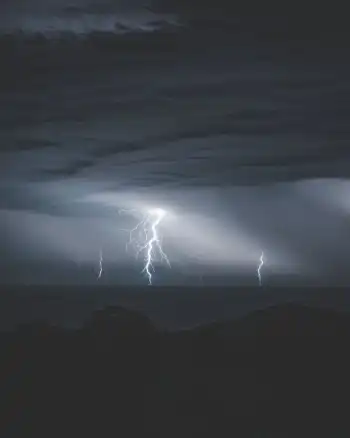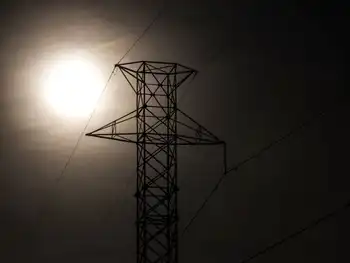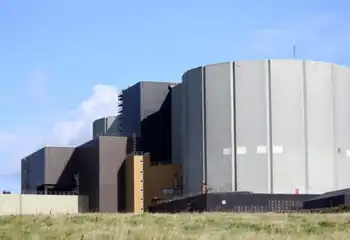Germans and French taking over BritainÂ’s nuclear industry
By The Evening Standard
Arc Flash Training CSA Z462 - Electrical Safety Essentials
Our customized live online or in‑person group training can be delivered to your staff at your location.

- Live Online
- 6 hours Instructor-led
- Group Training Available
That land was plots auctioned off by British civil servants next to the near-redundant nuclear power stations of Oldbury on the River Severn and Wylfa on Anglesey.
What E.On and RWE hope they have bought is — pending planning, community and technical consents — the right to build reactors on the two sites capable of producing six gigawatts of nuclear electricity. That is enough power for three million homes.
The German companies may have bought familiarity on the average British sofa by E.On's sponsorship the FA Cup and RWE's backing of Test cricket through its npower household supply arm, but their apparent love affair with the UK has much more to do with the realpolitik of the European energy industry.
Both companies have been in the UK for the last seven years, having bought both halves of the privatized Central Electricity Generating Board power station operator. E.On took over and then rebranded Powergen, and RWE acquired the old National Power, which had morphed into Innogy, trading as npower.
The companies' provenance goes back much further. The product of mergers between formerly state or municipally owned utilities, they have become the number one and number two German power companies. More pertinently, they are behind much of the 30% of German electricity generated by nuclear power stations.
But E.On and RWE are not in the UK on some cross-North Sea outreach initiative: it is because of conditions on the Continent — or more specifically that while the deregulated British market is open to competition and mergers and acquisitions, the rest of Europe is not.
That has seen E.On and RWE npower build up large shares of the UK residential and industrial supply market. The two control some of the largest power installations in the land, and are in the vanguard of next-generation projects such as the controversial “clean coal” station at Kingsnorth in Kent and, with huge subsidies, the would-be construction of the world's largest wind farm in the Thames estuary.
And the reawakening of nuclear in Britain comes at no more opportune time. Their own country — Europe's largest economy but in hock to the power politics of the Greens — has banned the building of new nuclear plants.
In France, E.On and RWE are banned from operating nuclear plants because they are, er, not French. In Britain, Europe's only open market, nuclear is the new growth market and the Germans want a substantial piece of it.
The E.On/RWE joint venture (which is to get a new “brand” soon) is not going to any great lengths to hide that theirs is a German project and not some job creation scheme for wannabe British nuclear engineers.
“We have a history of working together on nuclear in Germany and we will be making the most of our expertise,” said a spokesman for the joint venture. “We will be relying pretty heavily on the parent companies.”
And as always, it seems the Germans have got the best deal. The E.On/RWE commitment to spend and make big returns on £10 billion of investment comes after an initial outlay for its sites of £305 million.
French giant EDF is making a similar £10 billion investment commitment to build more than six gigawatts of new reactor capacity next to the existing nuclear power plants at Sizewell in Suffolk and at Hinkley Point in Somerset.
The difference is that EDF spent £12.5 billion buying the current UK nuclear generator British Energy to secure its sites; a deal that looked expensive at the time for a chronically underperforming UK company, and looks even more expensive compared with the outlay of E.On/RWE.
There is much talk that EDF now needs to get some of its money back, and word is that it might sell its network of tens of thousands of miles of cables and power lines providing electricity thoughout London, the South-East and East Anglia.
It also hopes to find buyers for land it owns at Bradwell in Essex and Dungeness in Kent to sell to another new entrant to the UK nuclear market.
With no sign of interest from Swedish nuclear outfit Vattenfall, that other entrant will be another French giant GDF Suez which with partner Iberdrola, the Spanish group that owns Scottish Power, was outbid for Wylfa and Oldbury.
However, the indications are that the GDF consortium may not be interested in EDF's offcuts as it expects to land a bid to build new reactors next to Sellafield in Cumbria.
If all the plans of EDF, E.On, RWE and GDF come to pass, that would mean the UK has commitments to have more than 15 gigawatts of nuclear energy up and running from about 2020. That is around 30% of the nation's daily electricity consumption and the highest proportion ever from nuclear.
And none of it British-owned. But then we are all Europeans now, nein?











